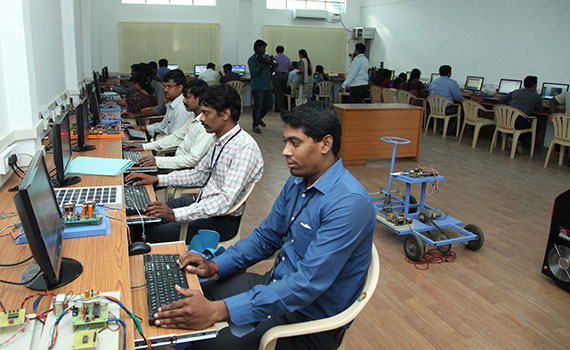

The Department of Computer Science & Engineering in Thangavelu Engineering College was established in the year 1995. This Department has all the necessary to carve a successful Computer Engineer of an international standard. The department attracts projects from outside and develops the software in its own project lab with the help of its eminent faculty members and students. Being a forerunner in the field, the Department is constantly modernizing its facilities to adapt itself to the rapidly changing technological scenario.
The vision of the Computer Science and Engineering Department is to make it nationally recognized and outstanding in Computer Science Education and enable students to work with commitment towards the progress of the nation.
To impart high quality professional education with emphasis on basic principles of Computer Science and Engineering.
To help all the students to develop their skills in solving the complex technological problems of modern society.
To provide a framework for promoting collaborations and multidisciplinary activities.
The B.E. Computer Science & Engineering was started in the year 1995. There are several ways to present the canonical core of Computer Science. Over the years we have developed a distinctive style and method that bridges the division between theory and practice yet remaining grounded with the core. The department is committed to the free software and open source movements, as typified by Linux. It further believes that reading and modifying open source code is an essential and effective tool for the practical software development.
PEO 1: Graduates of the programme will identify, formulate, analyze complex problems and provide effective solutions by applying the concepts of science, mathematics, engineering fundamentals and computing.
PEO 2: Graduates will be leaders and managers by effectively communicating at both technical and interpersonal levels.
PEO 3: Graduates of the programme will be professionally competent and successful in their chosen career through life-long learning.
1. An ability to apply the basic mathematical and scientific concepts that underlie modern computer science and engineering.
2. Identify, Formulate and analyze complex engineering problems reaching conclusions using the principles of mathematics and engineering sciences.
3. Design solutions for complex engineering problems and design system components or processes that meet the specified needs.
4. Use knowledge and research methods including design of experiments, analysis and interpretation of data.
5. An ability to use the techniques, skills, and modern engineering tools employed in computer science and engineering practice.
6. Apply contextual knowledge to assess societal and the consequent responsibilities relevant to the professional engineering practice
7. Understand the impact of the professional engineering solutions in societal and environmental contexts and demonstrate the Knowledge for sustainable development.
8. Apply ethical principles and commit to professional ethics responsibilities.
9. Function effectively as an individual and as a member or leader in different teams.
10. Communicate effectively on complex engineering activities with engineering community such as being able to comprehend and write effective reports and prepare documents, make presentations.
11. Provide recognition of the need for, an ability to engage in life-long learning and continuing professional development.
12. Demonstrate knowledge and understanding of the engineering principles and apply them to manage projects.
The M.E. Computer Science & Engineering course was started in the year 2013. The Department is fully equipped with the state of the art laboratories having only HP Machines with latest configurations. We have 7 Servers (3 -Linux, 4-Windows 2003 including 2 Backup Servers with x200 series and x205 series) connected to 282 P-IV nodes. The Department is having a rich repository of latest softwares. Periodic Guest lectures, workshops through CSI & ISTE, IE(I) Student Chapters are organized for the benefit of students to enrich their knowledge and to update with the current industry trends. An active Placement Training is functioning with full enthusiasm with the aim of placing the students in top-notch companies. The department shows excellent performances in examinations. Placement, research and consultancy, continuing education programmes, Industry Institute Partnership, and Publication by faculty members.
Apart from this our faculty member have multi expertisation in areas like Network Security, Grid Computing, Cloud computing Image Processing, Multimedia Systems and Embedded Systems etc., Our Students are encouraged to participate in various activities like Paper Presentation, Journal publications, Sports Activities and Cultural Activities. We provide them free environment to improve the student and faculty relationship. We also provide 32 Mbps leased line circuit for internet access round the clock Providing the content and the context, the department opens wide the windows for the students to seize the fleeting opportunities in the Industry.
The department provides extensive computing resources for research and education. This includes more than 300 high-performance computers in the range of Linux, Windows workstations and a good number of laptop systems. In addition to general purpose file server, the department maintains two specialized servers for database clients and Linux based workstations. Department network communications include a fiber optic backbone, offering 16 Mbps connectivity to the commodity internet and provides intranet within the Hi-tech lab, which hosts 11 laboratories. The department has wireless internet connectivity via a campus-wide 802.11b network to the laptops.

The Department is well equipped with 11 diversified laboratories including a dedicated laboratory for the Post-Graduate students installed with a variety of software catering to the needs of the students and covering the curriculum specified by the affiliated University.
The laboratories include:
* Microsoft Campus Agreement with Academic Licences for All Softwares